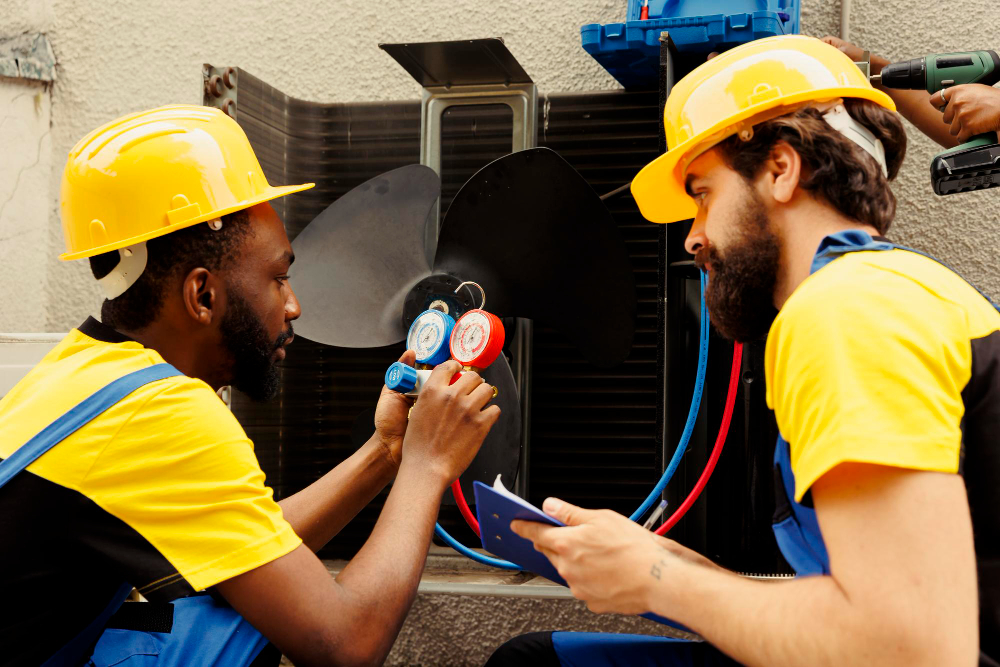
Introduction
An AC unit that freezes up is a common problem, particularly in regions with high humidity and fluctuating temperatures. This issue can significantly reduce your unit's efficiency, leading to higher energy bills and discomfort. Understanding the causes of AC unit freezing and implementing preventative measures can help you avoid this problem and ensure optimal performance.
Causes of AC Unit Freezing
Several factors can contribute to an AC unit freezing up. Some of the main common causes are:
- Restricted Airflow: Obstructions in the airflow path, such as clogged filters or vents, can prevent the unit from adequately removing heat and moisture from the air. This can lead to excessively cold evaporator coils, causing them to freeze.
- Low Refrigerant Levels: Refrigerant is the lifeblood of your AC's cooling system. If the refrigerant level is low, the evaporator coils can become too cold, leading to freezing.
- Dirty Evaporator Coils: Over time, dust and debris can accumulate on the evaporator coils, reducing their efficiency and causing them to freeze
- Faulty Blower Motor: A malfunctioning blower motor can disrupt airflow, causing the evaporator coils to become too cold..
- High Humidity: High humidity levels can increase the amount of moisture that the AC unit needs to remove. The evaporator coils may freeze if the unit cannot handle the moisture load.
Preventing AC Unit Freezing
To prevent your AC unit from freezing, follow these tips:
- Regular Maintenance: Schedule regular maintenance checks with a professional AC repair company in Dubai. During these checks, technicians can clean the evaporator coils, inspect the refrigerant levels, and identify any potential issues.
- Clean Filters: Regularly clean or replace your AC unit's air filters. Obstructed filters can impede airflow, leading to freezing
- Proper Ventilation: Ensure that your AC unit has adequate ventilation. This will help prevent the unit from becoming too cold and freezing.
- Check Refrigerant Levels: If you suspect your AC unit's refrigerant level is low, have it checked by a professional. Insufficient refrigerant can cause freezing and other issues
- Address Humidity Issues: If you live in a high-humidity area, consider using a dehumidifier to reduce the moisture levels in your home. This can help prevent your AC unit from freezing.
- Avoid Direct Sunlight: Install a shade or awning over your outdoor AC unit to protect it from direct sunlight. Excessive sunlight can cause the unit to overheat and work harder, increasing the risk of freezing. Enhance your outdoor space with trees or shrubs that offer natural shade for your AC unit
- Check for Leaks: If your AC unit is leaking refrigerant, it can cause the evaporator coils to become too cold and freeze. Immediately have a professional assess and fix any suspected leaks. Also ensure that there are no water leaks near your AC unit, as these can cause moisture to accumulate and contribute to freezing
- Keep the Unit Clean: Regularly clean the exterior of your AC unit to remove dirt, debris, and leaves that can obstruct airflow and reduce efficiency. As mentioned earlier, clean the evaporator coils to prevent buildup and improve heat transfer.
- Consider Duct Cleaning: If your ductwork is dirty or clogged, it can restrict airflow and cause the evaporator coils to freeze. Consider scheduling a professional duct cleaning to improve airflow and efficiency.
- Use a Programmable Thermostat: A programmable thermostat can help you set optimal cooling schedules and reduce energy consumption. This can help prevent your AC unit from working excessively hard and freezing.
- Avoid Overloading the Unit: If you're trying to cool multiple rooms with a single AC unit, it may be working too hard. Consider adding more units or improving insulation in the rooms you're trying to cool
- Monitor Outdoor Temperatures: If outdoor temperatures are extremely low, your AC unit may struggle to remove enough heat and moisture. Consider using a space heater or other supplemental heat source in affected rooms.
Signs of a Frozen AC Unit
If you notice any of the following signs, your AC unit may be frozen:
- Cold Air Stops Blowing: If cold air stops blowing from your vents, your AC unit may be frozen.
- Strange Noises: A frozen AC unit may make strange noises, such as rattling or banging.
- Ice Formation: If you can see ice forming on the outside of your AC unit, it is likely frozen.
What to Do if Your AC Unit Freezes
If your AC unit freezes, do not attempt to defrost it yourself. This can damage the unit and lead to further problems. Instead, reach out to a professional AC repair Dubai service to diagnose and fix the issue.
Conclusion
Preventing AC unit freezing requires regular maintenance, proper ventilation, and attention to humidity levels. By following these tips, you can help ensure that your AC unit operates efficiently and effectively throughout the year. If you experience freezing issues, it is important to seek professional help from the best AC Repair Service in Dubai































